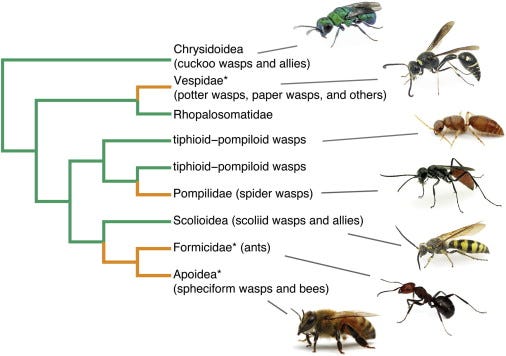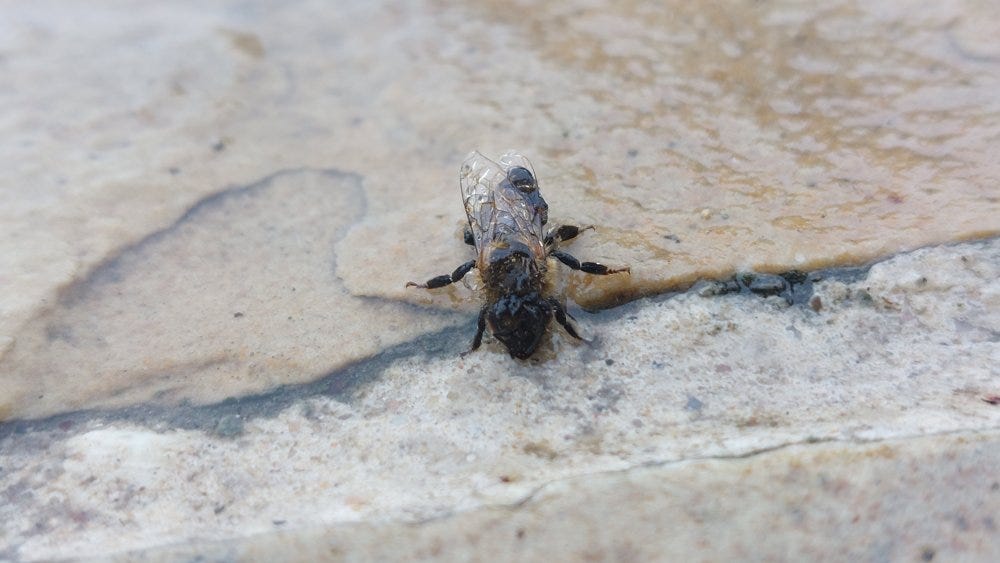A Flaming Match Head
It was a sorry sight, even if she started the fight
Happy Friday Sunday Monday!
And a warm welcome from the day that summer forgot.
For those of you new around these parts, welcome 👋 My name is David and I’m a writer, outdoor instructor, cyclist-at-large with Thighs of Steel and Expeditions Manager at British Exploring Society.
In this newsletter, I write stories that help you and me understand the world (and ourselves) a little better.
Today’s story has a soundtrack. When you’re ready, hit play and scroll:
Sometimes I get stung.
A Flaming Match Head
Globally, there are over 20,000 different species of bee and more than 250 of those are found in the UK.
But, after half an hour of clumsy research, I think this a European Honey Bee, Apis mellifera, the domesticated species that produces Pooh Bear’s favourite comestible:
And, yesterday, apropos of nothing, this particular specimen, a worker bee, landed on the fleshy nubbin twixt my thumb and forefinger, and lanced me with its venomous stinger.
The worker fell to the ground, her barbed needle lodged in my skin, injecting apitoxins from its venom sac into my blood until I plucked it out.
The pain hit me like, well, like, ‘a flaming match head … quenched first with lye and then sulfuric acid’.
Distracting myself from the caustic burn, we watched as the honey bee crawled away.
Tragically, we saw her slip in a tiny puddle, fall onto her back and struggle to right herself.
She finally managed to flip herself over and crawl a short distance to the lip of mortar between paving slabs.
She crawled no more.
It’s a myth that bees always die once they’ve spent their sting.
Bees sting to protect their hive. Their most common enemies are other insects, small critters with thin skins, against whom bees can use their stinger without fear of death.
As I witnessed first hand, the stinger pierces the skin of the victim, where it’s held fast by barbs, before detaching from the bee’s abdomen when it makes its escape.
But if the victim’s skin is excessively thick — such as in humans or other large mammals — the stinger is barbed too tightly in the thick skin.
Instead of detaching, the stinger is torn away, causing fatal damage to the bee’s belly, killing her in minutes.
It was a sorry sight, even if she started the fight.
There is another misconception (I won’t say myth) surrounding bees: their decline.
Of course, this graph condenses all nuance: yes, wild bees are found across more of the UK than in 1980 — but there are 158 species in the survey and 26 percent of them have become less widespread, with 7 percent showing a strong decline.
If we open up our graph to include hoverflies, another important pollinator, we see very different results:
There is no question that the overall numbers of pollinators is on long term decline in the UK. Even wasps have gone missing this summer.
This is a bad news for people who like to eat food.
(Side note: No surprise that wasps and bees are ancestral siblings, but I never knew that ants are part of the sisterhood.)

Looking at the positive: yesterday’s close encounter with a grumpy pollinator at least brought me into nature.
For most humans today, myself included, nature is an environment that I choose to enter on my own terms, when I’m ready for a short break from my timetabled, double-glazed workerdome.
There is little day-to-day awareness that I am a living part of an ecosystem, existing in relationship with other organisms. The plants that oxygenate the air I breathe; the fungi that vitalise the ground I walk on; the bees that pollinate the crops I eat.
Nature rarely troubles us. Nature rarely enters the adult human bubble on her terms. And when she does, it’s an inconvenience: rain at a picnic, leaves on the line, a bee sting.
I’d like to change that. I’d like to get to know her better.
Start With Ten
I firmly believe that, if you know ten of anything, then you’re comparably well-versed. Not an expert, but certainly more than a layman.
A busker who knows ten songs is no jukebox, but they can keep a crowd entertained for an hour.
If you can rustle up ten recipes by heart, then you’re not going to win Masterchef, but you will keep your family happily fed.
A person with ten good friends is hardly a social butterlfy, but they’ll never be short of confidantes or Saturday plans.
So let’s go through our ecosystem and chart the extent of my ignorance:
Can you identify and describe the habits and habitats of ten species of insect or other invertebrate? Despite today’s little foray into the world of bees and wasps, no, I can’t ❌ As far as I’m concerned, there are only three species of spider: money spiders, bath spiders and scary spiders.
Can you identify ten species of plant and describe their medicinal, nutritional, practical or cultural uses? Yes, I think I can! ✔ I’d be struggling if we separated trees from other plants, however.
How about ten species of fungi, moss, mould or lichen? Maybe two or three? ❌
Can you identify and describe the habits and habitats of ten species of mammal? If you include farmyard animals, I guess ✔ But if you mean our wild species, then probably not ❌
How about birds and their song? I’ve got pigeons down, and maybe a handful of others, so no ❌
Or fresh and saltwater fish and amphibians? Nope ❌ But I did learn today that Old English had a cute habit of giving animals nicknames that end in -g: dog, pig, hog, mog, stag, slug, earwig and, of course, frog.
Can you identify ten rocks and minerals? Chalk, sandstone, erm, gravel… ❌
Can you identify and describe ten weather systems, clouds or tides? Does ‘drizzle’ count? ❌
Or ten constellations, and describe their astronomical and cultural significance? Orion, the Bears, Cassiopeia ❌
Plenty of room for growth, eh?
Delete The Internet [🚀UPDATE]
I still don’t have a browser on my phone. Nothing bad continues to happen.
And I’ve survived a month without (too much) Whatsapp on my phone. Kind of…
Three Tiny Big Things
1. 50 things to do before you're 11¾
Nature’s school room, play room and medicine room, for humans from eleven to eleventy-one. From National Trust.
2. Britain's power system is totally ditching fossil fuels
3. COME ON EXPEDITION!
Fancy coming on expedition with British Exploring Society next year?
Applications are now open for all kinds of leadership roles for people with all kinds of different skills and backgrounds:
Social Leader 🧸
Knowledge Leader 🔬
Adventure Leader 🥾 (This is the only one that requires Mountain Leader training)
Basecamp Manager 👩🍳
Medical Leader 🩺
Thank You
Huge thanks to all the paying subscribers who helped make this story possible. You know who you are. Thank you. 💚
If you enjoyed this one, then go ahead and tell me. It’s the only way I’ll know. You can tap the heart button, write a comment, share the newsletter with friends, or simply reply to this email.
If you’re not into the whole Substack subscription thing, then you can also make a one-off, choose-your-own-contribution via PayPal. That’d make my day.
As always, thank you for your eyeballs and thanks for your support.
Big love,
dc:






